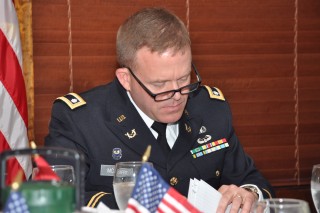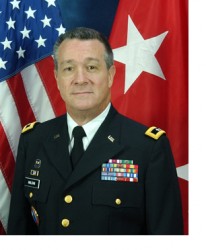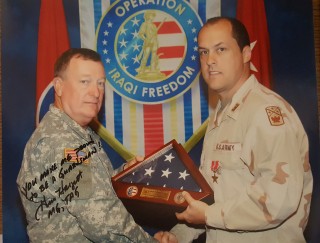Tennessee is proud to be home to a great number of military veterans whose past service will forever be an honor to both their state and country. These veterans hail from every corner of the state and occupy all kinds of different positions in civilian life. Today, some of them go by Judge.
In honor of Veterans Day we caught up with several of those Tennessee judges with distinguished records of military service and asked them how their time in the military has informed or influenced their careers on the bench. The answers varied, but all of them agreed that their service played an integral role in making them the judges they are today.
Judge Gina C. Higgins
The desire to practice law was instilled in 30th Judicial District Circuit Court Judge Gina C. Higgins at an early age.
“I always knew I wanted to do law,” she said. “I was a Perry Mason kind of girl.”
She followed that desire to the University of Memphis Cecil C. Humphreys School of Law, where she received her juris doctor in 1984. It was an experience she had during law school that inspired her to military service.
Judge Higgins worked for a couple of different legal service organizations while a law student in Memphis. One of those was located just over the river, in Arkansas.
While employed there, Judge Higgins had the privilege of working with an attorney who impressed her with his attention to detail and his legal acumen. She soon discovered why.
“It was his military training that gave him that upper hand, that made him stand out to me as a superior lawyer,” she said.
The man was an Army veteran and had served as a military lawyer, which intrigued Judge Higgins.
“I thought, that’s the kind of training I need, whatever it was he had,” Judge Higgins said.
She reported for active duty in 1985, as a direct commission to the United States Navy Judge Advocate General's Corps (JAG). The first step was Officer Indoctrination School in Newport, Rhode Island. This “crash course” in military training, where she did things like learn to wear the uniform and to salute, was followed by three months in Naval Justice School, where Judge Higgins was trained in military law.
The military law training was capped off with a brief temporary tour of duty aboard a naval oil supply ship, the USS Platte (AO-186), which supported the USS America's battle group fleet out of Norfolk, Virginia. The tour was designed to familiarize new JAG officers with the intricacies of shipboard life. Judge Higgins found it exciting to learn about the vessel and experience the ship being refueled at sea. Judge Higgins was the only female onboard the 180-personnel manned vessel.
Judge Higgins' first duty station was Naval Air Station Corpus Christi, Texas, where she would be stationed for the next three years. Recruiters had once promised her the chance to relax and work on her golf game in that scenic setting, but the reality was that she was incredibly busy right from the start in her new home.
“I got there, and the day I reported I got my first case and was in the court room the next day. It never slowed down,” she said.
A significant amount of that early workload consisted of cases involving Vietnam War deserters. Judge Higgins was assigned as a defense attorney and then as a claims officer. It was in the latter capacity that she received her first major commendation, a Navy Marine Corp Achievement Medal for the successful recovery of approximately $1 million dollars in medical expenses paid out by the Navy.
By the time her three-year active duty obligation was up, Judge Higgins had one child and another on the way. While she planned to end her military service, she was asked to stay on active duty and relocate to Naval Air Station Memphis in Millington, Tennessee. She again was assigned as the Claims Officer, but also received assigned duties as a Staff Judge Advocate to the commands and as defense counsel for criminal and administrative cases, especially in cases where the defendants requested the services of an African American attorney.
She was there for two years before she was reassigned to Naval Station Argentia in Newfoundland, Canada, where she continued her work as a JAG officer, serving as Legal Officer to the Commanding Officer. That base, a Cold War relic dedicated largely to the detection of enemy submarines, closed shortly thereafter. Judge Higgins describes this base as having been the best-kept secret in the Navy.
“It was a wonderful duty station,” she said.
The stint in Canada was the end of Judge Higgins’ active duty period, which amounted to seven years in total. Upon returning to Memphis, she affiliated with the United States Navy Reserve, where she remained an additional 13 years, serving in all southern states, Washington, and Naples, Italy. During that time she was assigned to provide services in matters such as wills, powers of attorney, divorces, child and spousal support, administrative discharges, and the occasional court martial.
Upon returning to Memphis, she entered private practice and was a founding partner of the all-women’s firm of Stotts Higgins Johnson. In 2010, she was elected to the seat on the 30th Judicial District Circuit Court that belonged to her former colleague, the late Judge Rita L. Stotts.
Judge Higgins views her time in military service as positive in a number of ways.
For one thing, it has helped her to better understand issues related to active duty personnel and veterans who appear before her in court.
“I think I have a great opportunity when individuals come in and they speak in military terms, I know it,” she said. “I understand exactly what they’re saying. I see it frequently in dealing with military pensions, Tricare, and former spouses benefits.”
More generally, though, the experiences she went through in the military simply better prepared her to be a successful lawyer and judge.
“The training lived up to what my expectation was when I first met that lawyer back in legal services in the ‘80s,” she said. “The military does give you a great training background, and I have a great appreciation for excellence, making sure lawyers do what they’re supposed to do the way they’re supposed to do it. I am detailed in terms of my orders. I learned a long time ago it’s not about you, it’s about the service and the product, and here we produce a good product.”
Judge L. Craig Johnson
Fourteenth Judicial District Circuit Court Judge L. Craig Johnson was 18 years old in January 1983 when he joined the Tennessee Army National Guard alongside some of his friends and was shipped off to basic training at Fort Bliss in Texas. Little did he know then that it was the beginning of a 32-year career with the National Guard.
After basic training, Judge Johnson went through the Reserve Officers’ Training Corps while an undergraduate at Middle Tennessee State University and received his commission as a second lieutenant in 1986.
He went on to earn his juris doctor at the University of Tennessee College of Law in 1990, just before his first deployment.
“I think I found out I passed the bar the week we shipped out of Fort Campbell,” Judge Johnson said.
He would spend eight months in Saudi Arabia and then Iraq serving as a combat engineer officer as part of Operation Desert Storm.
After several years in private practice, Judge Johnson was elected to his current position on the 14th Judicial District Circuit Court in 1998. Despite the demands of the bench, Judge Johnson remained closely involved with the National Guard, attending required drills, meetings, and annual training programs. As he achieved higher and higher ranks, his duties multiplied.
“Especially after 9/11, I got really busy,” he said. “It took up most of my weekends and a lot of my evenings. It was definitely a balancing act.”
That balancing act was most difficult during Judge Johnson’s subsequent deployments. He was mobilized as part of Operation Iraqi Freedom in 2005 and again in 2009-2010. He was also on active duty for a combined total of a year in various parts of Europe helping in the fight against terrorism.
“It was hard at times,” Judge Johnson admits. “I was gone for a year, a year-and-a-half sometimes. The Administrative Office of the Courts was very supportive. They helped me out a lot by sending senior judges and other judges to cover my docket. The local bar was very cooperative, too. We weathered through it.”
When he retired from the Tennessee Army National Guard in 2015, Judge Johnson had achieved the rank of Colonel. His last assignment with the National Guard was as Commander of the 194th Engineer Brigade in Jackson.
Not long after his retirement, though, duty called again. In 2016, Judge Johnson was chosen to take over as commanding general of the Tennessee State Guard, a position he still holds.
In all over the course of his service, Judge Johnson was given numerous commendations, including the Legion of Merit, three Bronze Stars, and two Meritorious Service Medals.
He has also continuously sought to help fellow veterans through his work with the Coffee County Veterans Treatment Court. Judge Johnson presides over that court, which seeks to “help ‘justice involved’ veterans get back on their feet and overcome their addictions and problems,” Judge Johnson said.
When looking back over the course of his military career, Judge Johnson sees clear ways in which that service informed his judicial service, making him the judge he is today.
“Just about anything requires teamwork,” he said. “Administering justice is no different. Getting to the bottom of things and getting to the truth is not just the job of the judge, it’s the job of everybody that’s involved in the administration of justice. It takes a team to get to the truth and of course in the military that’s what it’s all about, teamwork. It’s not just about the commander or the boss, it’s about everybody doing their job to get the mission accomplished.”
Judge W. Michael Maloan
Twenty-seventh Judicial District Chancellor W. Michael Maloan first enlisted in the Tennessee Air National Guard in 1968.
“One of my best friends from high school was going to get drafted, so he joined the National Guard in Memphis, and he asked me if I wanted to ride down with him,” Chancellor Maloan remembered. “And the recruiter said, You want to join, too?, and I said, Yeah, why not?”
Chancellor Maloan went to Lackland Air Force Base in Texas for basic training. While an enlisted member of the 164th Support Squadron of the Tennessee National Guard, Chancellor Maloan did his undergraduate studies at the University of Tennessee at Martin. He remained an enlisted member of the National Guard during his first year of law school at the University of Memphis Cecil C. Humphries School of Law as well.
Following his graduation from law school in 1974, Chancellor Maloan went into private practice for 15 years, before being elected Chancellor in 1990.
A couple of years before his election to the bench, Chancellor Maloan took a direct commission as a First Lieutenant in the Judge Advocate General’s Corps, in 1988.
As a JAG attorney, Chancellor Maloan was assigned to the 194th Engineer Brigade in Nashville, where he stayed until 2002. After that, Chancellor Maloan became the Deputy Staff Judge Advocate for the Tennessee Army National Guard for a couple of years before being elevated to the position of Staff Judge Advocate of the Tennessee National Guard in 2004. In that position, he served as the head lawyer for the Tennessee Military Department, which comprises both the Air and the Army National Guard. In 2005, Chancellor Maloan received a Master’s of Science in strategic studies from the U.S. Army War College.
In 2007, Chancellor Maloan was named Assistant Adjutant General – Army, of the Tennesee National Guard. When he retired from military service in 2012, Chancellor Maloan had achieved the rank of Major General and was Deputy Joint Forces Commander of the Tennessee National Guard in Nashville.
For his service, Chancellor Maloan received a number of awards, including the Meritorious Service Medal, the Legion of Merit, and the Army Commendation Medal with one bronze oak leaf cluster.
When Chancellor Maloan first took his commission in 1988, he saw the opportunity as one that would prove mutually beneficial to both his military and his civilian work. This proved to be the case and reverberated through the years, positively impacting his work as a judge.
“It was very helpful to me because my civilian occupation and my military occupation were both as an attorney, so one kind of complimented the other,” he said. “And, I took a lot of military legal courses, which were very valuable on the civilian side, so it was just a great opportunity to serve my country and also have a military occupation that was similar to my civilian occupation.”
Judge John McAfee
Eighth Judicial District Circuit Court Judge John McAfee was an ROTC scholarship student while an undergraduate at Lincoln Memorial University. During that time he attended Airborne School at Fort Benning, Georgia and earned his Air Assault Badge after finishing Air Assault School at Fort Gruber, Oklahoma.
Judge McAfee received his juris doctor from Samford University’s Cumberland School of Law in 1991 and then attended Judge Advocate General’s School. He went on active duty as a JAG officer in 1992. Assigned to the XVIII Airborne Corps at Fort Bragg, North Carolina, Judge McAfee quickly gained a wealth of trial experience, focusing mainly on criminal defense work.
In 1993, Judge McAfee was deployed to Mogadishu, Somalia, just in time to be on the ground during the period dramatized by the movie Black Hawk Down.
“I acted as a legal advisor to the force command in that theater at that time,” Judge McAfee said. “My legal responsibilities ranged from military matters or targeting matters, where they needed info about targeting points, to trying to help soldiers keep their cars from being repossessed back at Fort Bragg. We did a wide range of things while we were there.”
Judge McAfee returned to Fort Bragg in 1994. Later that year he went into private practice in Tazewell, Tennessee.
In 1998, he became a General Sessions Court judge in Claiborne County, while still a member of the Tennessee National Guard.
In 2002, Judge McAfee went into the United States Army Reserve. Two years later, he was elected to the 8th Judicial Circuit Court bench.
Judge McAfee became a United States Army trial judge in 2006, a position that saw him travel throughout the southeast trying active duty cases, often courts-martial, at military installations. He did this for eight years before retiring from the United States Army Reserve in 2014.
“The last eight years as a military trial judge in the Army was sort of full circle,” Judge McAfee said. “I spent my first three years on active duty as an attorney trying those cases and the last eight years I was a judge trying cases.”
When he looks back on his early active duty years, Judge McAfee sees a lot that went on to impact his life and his judicial career. For one thing, there are the amazing people he met while in the service.
“I have good memories of a lot of good people during that period of time, although there were some circumstances that were terribly difficult, especially on October 3, 1993,” Judge McAfee said.
That active duty period also gave him a valuable opportunity to amass a great deal of experience in the courtroom, as he remembers.
“I love trying cases, and I think that time benefited me greatly as a trial judge,” Judge McAfee said. “When you get in front of a judge, it’s obvious if that judge has had trial experience. Those first years out of law school, being at Fort Bragg and trying so many jury cases… I was literally in front of a panel every week. You just don’t get that experience in the civilian world.”
Judge McAfee received numerous awards and medals during his military service, with his highest decoration being the Legion of Merit Award.
Judge Joe H. Walker, III
Twenty-fifth Judicial District Circuit Court Judge Joe H. Walker was drafted into the United States Army Infantry in 1968. He did his basic and advanced infantry training at Fort Dix, New Jersey, and then went to Officer Candidate School at Fort Benning, Georgia.
His first duty station was at Fort Jackson, South Carolina. He was there for about eight months before he was deployed to Vietnam, where he served in the 23rd Infantry in I Corps.
After a year, he rotated to Fort Belvoir, Virginia, where he stayed an additional year.
When his service was complete, he went to graduate school and then law school on the G.I. Bill. He was associate editor of the Law Review at the University of Memphis Cecil C. Humphreys School of Law, where earned his juris doctor in 1976.
Upon graduation, Judge Walker went into private practice with his father in Ripley, Tennessee. His first experience on the bench came in 1982, when he was appointed Chancellor for nine counties and served for 12 months during an election contest. Afterwards, he became the city judge for Ripley, which coincided with more years in private practice. In 1990, Judge Walker won election to the seat that he currently occupies on the 25th Judicial District Circuit Court.
For Judge Walker, military service was a life-changer. For one thing, it broadened his horizons in ways he could not have imagined.
“I hadn’t traveled very much so I got to spend a year seeing how other people live in what was at the time a very poor Asian country,” he said. In the rural areas where he did his tour of duty, there was no electricity, no indoor plumbing, but that was just life.
“It broadened your perspective,” he said. “I think it did for everybody over there. When I came back, I was very thankful for the way of life we as Americans have.”
Judge Walker’s military service also changed him in ways that turned him into the person and judge that he is today.
“Discipline and maturity are the two main things that proved beneficial to me that made me glad I had the experience instead of regretting it,” he said. As an undergraduate, before he was drafted, Judge Walker was a self-described average student. When he got back he had a new determination and a new ambition to realize his full potential.
Judge Walker was awarded a Bronze Star, two Army Commendation Medals, and a Vietnam Service Medal for his military service.







